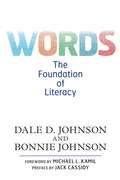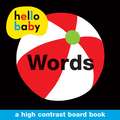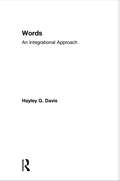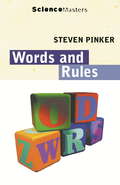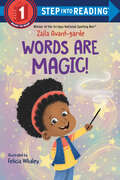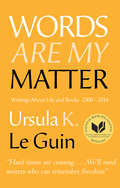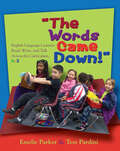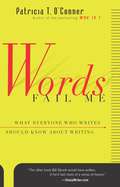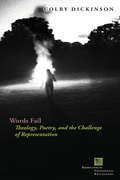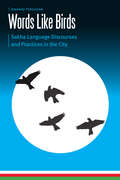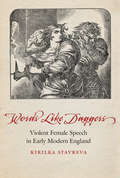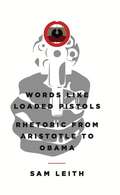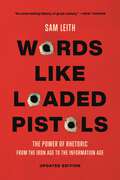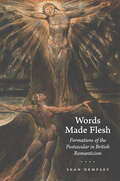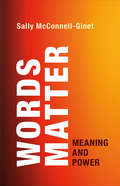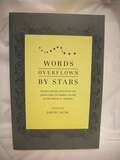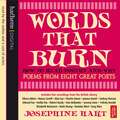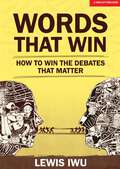- Table View
- List View
Wordly Wise, Grade K
by Cheryl DressierWordly Wise 3000 Level K develops key oral vocabulary that lays the foundation for literacy success and prepares students for the content area reading they will encounter in later grades. Vibrant illustrations motivate children and keep them focused while reinforcing key vocabulary words and concepts through a variety of teacher-led activities.
Words
by Dale D. Johnson Bonnie JohnsonWritten by respected authorities in the fields of education and literacy studies,Words: The Foundation of Literacyis a groundbreaking book for teachers, administrators, and education students. Dale and Bonnie Johnson present a fresh, inspiring reminder of why studying language—from word origins to word structure—is such a vital first step in the development of students’ vocabulary, literacy, writing skills, and overall ability to learn. At a time when high-stakes testing has squeezed substance from many curricula, Johnson and Johnson provide ways to enhance students’ understanding, interest, and appreciation of language and all its subtleties. Wordsexplores how meaning in language is created by the use and interrelationships of words, phrases, and sentences, their denotations, connotations, implications, and ambiguities. From birth, most children exhibit a natural interest in language—its sounds, nuances, and unpredictable qualities. It is important to sustain, stimulate, and recapture that natural interest in the classroom, andWordsprovides a multitude of creative and practical techniques for doing so.
Words
by Dale D. Johnson Bonnie JohnsonWritten by respected authorities in the fields of education and literacy studies, Words: The Foundation of Literacy is a groundbreaking book for teachers, administrators, and education students. Dale and Bonnie Johnson present a fresh, inspiring reminder of why studying language--from word origins to word structure --is such a vital first step in the development of students’ vocabulary, literacy, writing skills, and overall ability to learn. At a time when high-stakes testing has squeezed substance from many curricula, Johnson and Johnson provide ways to enhance students’ understanding, interest, and appreciation of language and all its subtleties. Words explores how meaning in language is created by the use and interrelationships of words, phrases, and sentences, their denotations, connotations, implications, and ambiguities. From birth, most children exhibit a natural interest in language--its sounds, nuances, and unpredictable qualities. It is important to sustain, stimulate, and recapture that natural interest in the classroom, and Words provides a multitude of creative and practical techniques for doing so.
Words
by Dale D. Johnson Bonnie JohnsonWritten by respected authorities in the fields of education and literacy studies, Words: The Foundation of Literacy is a groundbreaking book for teachers, administrators, and education students. Dale and Bonnie Johnson present a fresh, inspiring reminder of why studying language--from word origins to word structure--is such a vital first step in the development of students' vocabulary, literacy, writing skills, and overall ability to learn. At a time when high-stakes testing has squeezed substance from many curricula, Johnson and Johnson provide ways to enhance students' understanding, interest, and appreciation of language and all its subtleties. Words explores how meaning in language is created by the use and interrelationships of words, phrases, and sentences, their denotations, connotations, implications, and ambiguities. From birth, most children exhibit a natural interest in language--its sounds, nuances, and unpredictable qualities. It is important to sustain, stimulate, and recapture that natural interest in the classroom, and Words provides a multitude of creative and practical techniques for doing so.
Words (Hello Baby)
by Roger PriddyFrom a bright yellow sun to a juicy red strawberry, the high-contrast pictures in this board book will captivate babies. The alternating black and white backgrounds allow babies to focus on both the clearly defined pictures and the contrasting colors, as they look at and learn their very first words.
Words - An Integrational Approach (Routledge Advances in Communication and Linguistic Theory #1)
by Hayley G. DavisAims to reorient the study of language by taking into serious consideration the perspective on linguistic matters taken by lay speakers themselves, as a response to the now inescapable conclusion that traditional linguistic theory, with its focus on revealing 'the facts of language in general', cannot handle the necessary indeterminacy of what is said and understood.
Words And Rules (SCIENCE MASTERS)
by Prof Steven PinkerOne of the world's science superstars presents a brilliantly illuminating, entertaining and cutting-edge account of how language actually works.How does language work? How do children learn their mother tongue? Why do languages change over time, making Chaucer's English almost incomprehensible? Steven Pinker explains the profound mysteries of language by picking a deceptively simple single phenomenon and examining it from every angle. That phenomenon - the existence of regular and irregular verbs - connects an astonishing array of topics in the sciences and humanities: the history of languages; the illuminating errors of children as they begin to speak; the sources of the major themes in the history of Western philosophy; the latest techniques in identifying genes and imaging the living brain. Pinker makes sense of all of this with the help of a single, powerful idea: that language comprises a mental dictionary of memorized words and a mental grammar of creative rules.
Words Are Magic! (Step into Reading)
by Zaila Avant-gardeScripps National Spelling Bee champ Zaila Avant-garde shares her love of words with new readers in this level 1 Step Into Reading book.Words are magic! Have you heard? Pick a letter. Make a word! New readers will find joyful encouragement in this level 1 easy reader that sings out about the magic of words. Encouraging kids to mix words, match words, shout and rap words, Scripps National Spelling champ Zaila Avante-garde takes readers along on a noisy and boisterous celebration of letters, sounds, and reading. It's the perfect first step for new readers, full of fun and energy, from one of America's most exciting and unique young voices. Step 1 Readers feature big type and easy words for children who know the alphabet and are eager to begin reading. Rhyme and rhythmic text paired with picture clues help children decode the story.Also available by Zaila Avant-garde:Words of Wonder from Z to AIt's Not Bragging If It's True
Words Are My Matter: Writings About Life and Books, 2000-2016, with a Journal of a Writers Week
by Ursula K. Le GuinThis collection of Ursula K. Le Guin's recent talks, essays, introductions is the best manual we have for exploring the worlds explored in recent fiction; the most useful guide to the country we're visiting, life.
Words Came Down!: English Language Learners Read, Write, and Talk Across the Curriculum, K-2
by Emelie Parker Tess PardiniAs teachers everywhere find more and more students with limited English in their classes, many are asking: How can I include ELL students in every aspect of the day? The Words Came Down!: English Language Learners Read, Write, and Talk Across the Curriculum, K-2 oral language is emphasized in a continuum from teacher modeling and demonstration to situations in which student-to-student communication is essential. The authors show that when children's attempts at communicating are accepted and celebrated, they will learn to communicate with each other comfortably and spontaneously whether on the playground or working on a science experiment. Beginning with designing a classroom that welcomes students and creates appropriate conditions for learning, Emelie Parker and Tess Pardini go on to detail a workshop format for reading, writing and content-area studies. The workshop structure allows teachers to differentiate instruction to include all students, and affords students ample opportunities to collaborate with others as they learn to speak, read, write, and comprehend while also engaging in active learning of the curriculum. The authors provide numerous examples of ways that teachers can become proficient in knowing each child and orchestrating instruction to meet individual needs. In addition, this helpful guide offers a variety of approaches to assessment, and demonstrates the importance of engaging families as partners in learning English and content.
Words Fail Me: What Everyone Who Writes Should Know about Writing (Read-On)
by Patricia T. O'ConnerFrom the bestselling author of Woe Is I: A guide to grammar fundamentals that&’s sympathetic to the struggling writer and often just plain funny&” (The Seattle Times). Whether you need to improve your skills for work or school, or aspire to the Great American Novel, a grounding in grammar, spelling, and punctuation is essential—not just to make you look like a professional but to communicate effectively in emails, essays, or anything you need to write. This painless, practical book is filled with short, snappy chapters, crystal-clear examples, and a &“playful sense of humor&” (The New York Times Book Review)—covering everything from &“Pronoun Pileups&” and &“Verbs That Zing&” to &“What to Do When You&’re Stuck.&” With these simple, straightforward tips, you can learn how to sort your thoughts and make sentences that make sense. &“Students writing papers, employees preparing reports, and those who just want to be understood in print may benefit from this fun-to-use answer to Strunk and White. O&’Connor uses humor as she takes apart sentences and their parts and shows how each element is used effectively.&” —Booklist
Words Fail: Theology, Poetry, and the Challenge of Representation (Perspectives in Continental Philosophy)
by Colby DickinsonThere has been much philosophical speculation on the potential failure of language as well as the search for a presentation of the “thing itself” beyond representation. Words Fail pursues the writings of a trio of philosophers—Jacques Derrida, Philippe Lacoue-Labarthe, and Giorgio Agamben—as prime examples of how modern poetry presents us with a profitable vantage point from which to survey the ongoing struggle of living in a highly fragmented world.Alongside these thinkers, this book looks specifically at the form of spirituality that is given shape by this intersection of poetics and theological-philosophical reflection—all of which offer rich suggestions about our spiritual nature.
Words Like Birds: Sakha Language Discourses and Practices in the City (Borderlands and Transcultural Studies)
by Jenanne FergusonWhat does it mean to speak Sakha in the city? Words Like Birds, a linguistic ethnography of Sakha discourses and practices in urban far eastern Russia, examines the factors that have aided speakers in maintaining—and adapting—their minority language over the course of four hundred years of contact with Russian speakers and the federal power apparatus.Words Like Birds analyzes modern Sakha linguistic sensibilities and practices in the urban space of Yakutsk. Sakha is a north Siberian Turkic language spoken primarily in the Sakha Republic (Yakutia) in the northeastern Russian Federation. For Sakha speakers, Russian colonization in the region inaugurated a tumultuous history in which their language was at times officially supported and promoted and at other times repressed and discouraged. Jenanne Ferguson explores the communicative norms that arose in response to the top-down promotion of the Russian language in the public sphere and reveals how Sakha ways of speaking became emplaced in villages and the city’s private spheres. Focusing on the language ideologies and practices of urban bilingual Sakha-Russian speakers, Ferguson illuminates the changes that have taken place in the first two post-Soviet decades, in contexts where Russian speech and communicative norms dominated during the Soviet era. Weaving together three major themes—language ideologies and ontologies, language trajectories, and linguistic syncretism—this study reveals how Sakha speakers transform and adapt their beliefs, evaluations, and practices to revalorize a language, maintain and create a sense of belonging, and make their words heard in Sakha again in many domains of city life. Like the moveable spirited words, the focus of Words Like Birds is mobility, change, and flow, the tracing of the situation of bilinguals in Yakutsk.
Words Like Daggers: Violent Female Speech in Early Modern England (Early Modern Cultural Studies)
by Kirilka StavrevaDramatic and documentary narratives about aggressive and garrulous women often cast such women as reckless and ultimately unsuccessful usurpers of cultural authority. Contending narratives, however, sometimes within the same texts, point to the effective subversion and undoing of the normative restrictions of social and gender hierarchies. Words Like Daggers explores the scolding invectives, malevolent curses, and ecstatic prophesies of early modern women as attested to in legal documents, letters, self-narratives, popular pamphlets, ballads, and dramas of the era. Examining the framing and performance of violent female speech between the 1590s and the 1660s, Kirilka Stavreva dismantles the myth of the silent and obedient women who allegedly populated early modern England. Blending gender theory with detailed historical analysis, Words Like Daggers asserts the power of women’s language—the power to subvert binaries and destabilize social hierarchies, particularly those of gender—in the early modern era. In the process Stavreva reconstructs the speech acts of individual contentious women, such as the scold Janet Dalton, the witch Alice Samuel, and the Quaker Elizabeth Stirredge. Because the dramatic potential of women’s powerful rhetorical performances was recognized not only by victims and witnesses of individual violent speech acts but also by theater professionals, Stavreva also focuses on how the stage, arguably the most influential cultural institution of the Renaissance, orchestrated and aestheticized women’s fighting words and, in so doing, showcased and augmented their cultural significance.
Words Like Loaded Pistols
by Sam LeithLeith, a British journalist and writer, offers a no-nonsense introduction to rhetoric for an intelligent, but non-academic audience. He uses both historical and contemporary, real and literary examples to present where western rhetoric comes from and how it has been taught/used over the ages; what the terms of rhetoric are; why different arguments work the way they do and why some arguments work while others don't. The aim of the book is to instill a practical awareness for rhetoric. He considers five parts of rhetoric--invention, arrangement, style, memory, and delivery--as well as three branches of oratory--deliberative, judicial, and epideictic rhetoric. Along the way he draws on great speeches and "champions of rhetoric," from Martin Luther King to Satan to Barack Obama to Hitler to Cicero. There is a glossary of rhetorical terms in the back. Annotation ©2012 Book News, Inc. , Portland, OR (booknews. com)
Words Like Loaded Pistols
by Sam LeithRhetoric is all around us. It's what inspires armies, convicts criminals, and makes or breaks presidential candidates. And it isn't just the preserve of politicians. It's in the presentation to a key client, the half-time talk in the locker room, and the plea to your children to eat their vegetables. Rhetoric gives words power: it persuades and cajoles, inspires and bamboozles, thrills and misdirects. You have been using rhetoric yourself, all your life. After all, you know what a rhetorical question is, don't you?In Words Like Loaded Pistols, Sam Leith traces the art of persuasion, beginning in ancient Syracuse and taking us on detours as varied and fascinating as Elizabethan England, Milton's Satanic realm, the Springfield of Abraham Lincoln and the Springfield of Homer Simpson. He explains how language has been used by the great heroes of rhetoric (such as Cicero and Martin Luther King Jr.), as well as some villains (like Adolf Hitler and Richard Nixon.)Leith provides a primer to rhetoric's key techniques. In Words Like Loaded Pistols, you'll find out how to build your own memory-palace; you'll be introduced to the Three Musketeers: Ethos, Pathos and Logos; and you'll learn how to use chiasmus with confidence and occultation without thinking about it. Most importantly of all, you will discover that rhetoric is useful, relevant - and absolutely nothing to be afraid of.
Words Like Loaded Pistols
by Sam LeithRhetoric is all around us. It's what inspires armies, convicts criminals, and makes or breaks presidential candidates. And it isn't just the preserve of politicians. It's in the presentation to a key client, the half-time talk in the locker room, and the plea to your children to eat their vegetables. Rhetoric gives words power: it persuades and cajoles, inspires and bamboozles, thrills and misdirects. You have been using rhetoric yourself, all your life. After all, you know what a rhetorical question is, don't you?In Words Like Loaded Pistols, Sam Leith traces the art of persuasion, beginning in ancient Syracuse and taking us on detours as varied and fascinating as Elizabethan England, Milton's Satanic realm, the Springfield of Abraham Lincoln and the Springfield of Homer Simpson. He explains how language has been used by the great heroes of rhetoric (such as Cicero and Martin Luther King Jr.), as well as some villains (like Adolf Hitler and Richard Nixon.)Leith provides a primer to rhetoric's key techniques. In Words Like Loaded Pistols, you'll find out how to build your own memory-palace; you'll be introduced to the Three Musketeers: Ethos, Pathos and Logos; and you'll learn how to use chiasmus with confidence and occultation without thinking about it. Most importantly of all, you will discover that rhetoric is useful, relevant - and absolutely nothing to be afraid of.
Words Like Loaded Pistols
by Sam LeithRhetoric is all around us. It’s what inspires armies, convicts criminals, and makes or breaks presidential candidates. And it isn’t just the preserve of politicians. It’s in the presentation to a key client, the half-time talk in the locker room, and the plea to your children to eat their vegetables. Rhetoric gives words power: it persuades and cajoles, inspires and bamboozles, thrills and misdirects. You have been using rhetoric yourself, all your life. After all, you know what a rhetorical question is, don’t you? In Words Like Loaded Pistols, Sam Leith traces the art of persuasion, beginning in ancient Syracuse and taking us on detours as varied and fascinating as Elizabethan England, Milton’s Satanic realm, the Springfield of Abraham Lincoln and the Springfield of Homer Simpson. He explains how language has been used by the great heroes of rhetoric (such as Cicero and Martin Luther King Jr. ), as well as some villains (like Adolf Hitler and Richard Nixon. ) Leith provides a primer to rhetoric’s key techniques. In Words Like Loaded Pistols, you’ll find out how to build your own memory-palace; you’ll be introduced to the Three Musketeers: Ethos, Pathos and Logos; and you’ll learn how to use chiasmus with confidence and occultation without thinking about it. Most importantly of all, you will discover that rhetoric is useful, relevant - and absolutely nothing to be afraid of.
Words Like Loaded Pistols: Rhetoric from Aristotle to Obama
by Sam LeithIn Words Like Loaded Pistols, Sam Leith traces the art of persuasion, beginning in ancient Syracuse and taking us on detours as varied and fascinating as Elizabethan England, Milton's Satanic realm, the Springfield of Abraham Lincoln and the Springfield of Homer Simpson. He explains how language has been used by the great heroes of rhetoric (such as Cicero and Martin Luther King Jr.), as well as some villains (like Adolf Hitler and Richard Nixon.) Words Like Loaded Pistols is a primer to rhetoric's key techniques; you'll find out how to build your own memory-palace; you'll be introduced to the Three Musketeers: Ethos, Pathos and Logos; and you'll learn how to use chiasmus with confidence and occultation without thinking about it. Most importantly of all, you will discover that rhetoric is useful, relevant - and absolutely nothing to be afraid of.
Words Made Flesh: Formations of the Postsecular in British Romanticism (Studies in Religion and Culture)
by Sean DempseyReligion is not merely a different way of thinking but is rather an alternative manner of being—it is both a way of attending to the world and a form of embodiment. Literature provides another key to legislating new ways of being in the world. Some of the best Romantic literature can be understood as experimental attempts to access and harness infrasensible energy—affects and dispositions operating beneath the threshold of consciousness—in the hope that by so doing it may become possible to project elusive affects into the practical world of conscious thinking and judgment. Words Made Flesh demonstrates how the Romantic poets Samuel Taylor Coleridge, John Keats, and Percy Bysshe Shelley and the novelist Jane Austen affect, mediate, and ultimately alter our very sense of embodiment in ways that have lasting effects on readers’ affective, political, and spiritual lives. Such works, which unsettle habitual ways of seeing, are perennially valuable because they not only call attention to the dispositions we normally inhabit, but they also suggest ways of forging new patterns and forms of life through the medium of embodiment.Drawing on the work of these writers, Dempsey argues that Romanticism’s contribution to our understanding of the postsecular becomes clearer when considered in relation to three timely scholarly conversations not previously synthesized: secular and postsecular studies, affect theory, and media studies. By weaving together these three strands, Words Made Flesh clarifies how Romanticism provides a useful field guide to the new geography of the self ushered in by secular modernity, while also pointing toward potential postsecular futures. Ultimately, Dempsey argues for a view of literature that recognizes it as an essential component to ethical practice.
Words Matter: Meaning and Power
by Sally McConnell-GinetHistory and current affairs show that words matter - and change - because they are woven into our social and political lives. Words are weapons wielded by the powerful; they are also powerful tools for social resistance and for reimagining and reconfiguring social relations. Illustrated with topical examples, from racial slurs and sexual insults to preferred gender pronouns, from ethnic/racial group labels to presidential tweets, this book examines the social contexts which imbue words with potency. Exploring the role of language in three broad categories - establishing social identities, navigating social landscapes, and debating social and linguistic change - Sally McConnell-Ginet invites readers to examine critically their own ideas about language and its complicated connections to social conflict and transformation. Concrete and timely examples vividly illustrate the feedback loop between words and the world, shedding light on how and why words can matter.
Words Overflown By Stars: Creative Writing Instruction and Insight From The Vermont College MFA Program
by David JaussFeaturing instruction from past and present faculty members of the acclaimed M.F.A. in Writing Program at Vermont College of Fine Arts, including Mark Doty, Douglas Glover, Robin Hemley, Richard Jackson, Sydney Lea, Bret Lott, Sue William Silverman, David Wojahn, and Xu Xi, Words Overflown By Stars gives you unprecedented access to a top literary education. <p><p>This comprehensive resource covers a wide variety of topics, including the creative process, titles, beginnings, voice and style, point of view, novel and short story structure, the role of dreams and fantasy in fiction, the often-blurry borderline between fiction and creative nonfiction, the subgenres of creative nonfiction, music and time in poetry, image patterning, "saying the unsayable," multiculturalism, the art of revision, and much more. <p><p>Both provocative and practical, the essays in Words Overflown by Stars distill many of the lessons that have made the graduates of Vermont College of Fine Arts so successful.
Words That Burn
by Josephine HartFollowing the success of CATCHING LIFE BY THE THROAT, Josephine Hart compiles more poetry from the like of such poets as Milton, Byron, Keats, Shelley, Browning, Frost and Lowell. Read by a dazzling cast of actors including Eileen Atkins, Nancy Carroll, Alan Cox, Charles Dance, Joanna David, Lindsay Duncan, Edward Fox, Emilia Fox, Robert Hardy, Tom Hollander, Jeremy Irons, Felicity Kendall, Elizabeth McGovern, Mark Strong, Dominic West, Greg Wise
Words That Win: How to win the debates that matter
by Lewis IwuAn insider's guide for students and teachers on how to debate, ranging from how to deliver speeches confidently in a large room to how to respond to arguments effectively. The final section of the book will argue why this activity is important for every child to take part - for social mobility, democratic and economic reasons. Throughout the book, Lewis (a former world university debating champion and a world championship winning coach with England) will draw from examples from his 10 years of experience coaching debates in over 11 countries
Words That Win: How to win the debates that matter
by Lewis IwuAn insider's guide for students and teachers on how to debate, ranging from how to deliver speeches confidently in a large room to how to respond to arguments effectively. The final section of the book will argue why this activity is important for every child to take part - for social mobility, democratic and economic reasons. Throughout the book, Lewis (a former world university debating champion and a world championship winning coach with England) will draw from examples from his 10 years of experience coaching debates in over 11 countries

